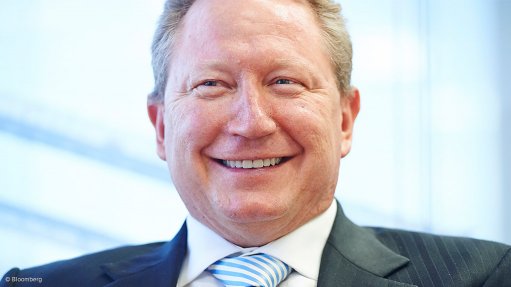
Fortescue founder and chairperson Andrew Forrest
Photo by: Bloomberg
PERTH (miningweekly.com) – The resources sector has warned that scrapping of the existing diesel fuel tax credit could damage the Australian mining and exploration industry.
The warning comes after reports emerged that iron-ore founder Andrew Forrest was privately lobbying the federal government to phase out the diesel subsidy.
The proposed changes include phasing out the multibillion-dollar diesel fuel tax credit and using the money to support development of a green energy industry such as hydrogen.
Forrest, through the green energy arm of iron-ore major Fortescue Metals, Fortescue Future Industries (FFI), is backing hydrogen as the future fuel to drive the resources sector, and has undertaken a hydrogen mobility project at its Christmas Creek operation, comprising the construction of a renewable hydrogen refuelling facility and deployment of a fleet of hydrogen fuel cell passenger coach.
The company is also partnering with Williams Advanced Engineering to design, build, test and integrate a battery system to power an electric mining haul truck, as an important first step to decarbonising its mining haul fleet.
FFI for its part, has ambitions to become a global hydrogen supplier, with Forrest previously saying that the company’s goal was to supply at least 15-million tonnes of green hydrogen annually, by 2030.
The Minerals Council of Australia (MCA) has warned that scrapping the diesel fuel tax credit would create a new tax for many of Australia’s industries, undermine their competitiveness and adversely impact thousands of jobs in regional Australia.
“It would also create financial hardship for some of Australia’s most remote communities,” MCA CEO Tania Constable said.
“The fuel tax credit scheme is not a subsidy. The cost to taxpayers is zero. Any move to reduce eligibility for the fuel tax credit scheme would introduce a tax distortion by imposing a levy on industries that are reliant on diesel fuel to generate power and operate heavy machinery off road or in heavy on-road transportation vehicles.
“Fishing fleets, tourism craft, farming machinery, mining and resources vehicles, ferries and tug boats should not pay a road tax.
“Australian mining is a major and growing contributor to jobs, investment and communities and has kept Australia’s economy and the communities in which it operates strong during the Covid-19 pandemic,” said Constable.
“The mining industry has generated a new record high of almost A$300-billion in export revenue for the Australian economy in 2020/21 and pays its fair share of taxes and royalties.”
The Association of Mining and Exploration Companies (Amec) has echoed the warning.
“While we support the development of greener fuel sources as a way to help our industry and the world decarbonise, the diesel fuel tax credit provides critically important support for these small industry players and we are absolutely opposed to any change to the credit,” said Amec CEO Warren Pearce.
“Right now, hundreds of exploration and mining companies have no choice to use anything other than diesel for mobile and remote operations, changes to this would prevent a number of exploration projects from development, impacting jobs and the livelihoods of remote communities.”
Pearce said on Monday that once hydrogen fuel sources, and the infrastructure to support it have been developed, these companies would transition from diesel, but until that happens, and these new technologies are available they had no choice.
“It is not an exaggeration to say that the proposed phasing out of the diesel fuel tax credit would lead to regional job losses. Cutting the credit would hurt regional Australia and damage our industry’s international competitiveness.”
“Our mining and exploration industry has kept Australia’s economy strong during the Covid-19 pandemic by operating safely in some of Australia’s more remote and vulnerable communities. Many of these operations have been made possible by diesel and the diesel fuel tax credit,” said Pearce.